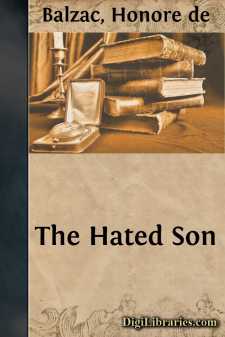Categories
- Antiques & Collectibles 13
- Architecture 36
- Art 48
- Bibles 22
- Biography & Autobiography 813
- Body, Mind & Spirit 142
- Business & Economics 28
- Children's Books 17
- Children's Fiction 14
- Computers 4
- Cooking 94
- Crafts & Hobbies 4
- Drama 346
- Education 46
- Family & Relationships 57
- Fiction 11829
- Games 19
- Gardening 17
- Health & Fitness 34
- History 1377
- House & Home 1
- Humor 147
- Juvenile Fiction 1873
- Juvenile Nonfiction 202
- Language Arts & Disciplines 88
- Law 16
- Literary Collections 686
- Literary Criticism 179
- Mathematics 13
- Medical 41
- Music 40
- Nature 179
- Non-Classifiable 1768
- Performing Arts 7
- Periodicals 1453
- Philosophy 64
- Photography 2
- Poetry 896
- Political Science 203
- Psychology 42
- Reference 154
- Religion 513
- Science 126
- Self-Help 84
- Social Science 81
- Sports & Recreation 34
- Study Aids 3
- Technology & Engineering 59
- Transportation 23
- Travel 463
- True Crime 29
The Deserted Woman
by: Honore de Balzac
Categories:
Description:
Excerpt
THE DESERTED WOMAN
In the early spring of 1822, the Paris doctors sent to Lower Normandy a young man just recovering from an inflammatory complaint, brought on by overstudy, or perhaps by excess of some other kind. His convalescence demanded complete rest, a light diet, bracing air, and freedom from excitement of every kind, and the fat lands of Bessin seemed to offer all these conditions of recovery. To Bayeux, a picturesque place about six miles from the sea, the patient therefore betook himself, and was received with the cordiality characteristic of relatives who lead very retired lives, and regard a new arrival as a godsend.
All little towns are alike, save for a few local customs. When M. le Baron Gaston de Nueil, the young Parisian in question, had spent two or three evenings in his cousin's house, or with the friends who made up Mme. de Sainte-Severe's circle, he very soon had made the acquaintance of the persons whom this exclusive society considered to be "the whole town." Gaston de Nueil recognized in them the invariable stock characters which every observer finds in every one of the many capitals of the little States which made up the France of an older day.
First of all comes the family whose claims to nobility are regarded as incontestable, and of the highest antiquity in the department, though no one has so much as heard of them a bare fifty leagues away. This species of royal family on a small scale is distantly, but unmistakably, connected with the Navarreins and the Grandlieu family, and related to the Cadignans, and the Blamont-Chauvrys. The head of the illustrious house is invariably a determined sportsman. He has no manners, crushes everybody else with his nominal superiority, tolerates the sub-prefect much as he submits to the taxes, and declines to acknowledge any of the novel powers created by the nineteenth century, pointing out to you as a political monstrosity the fact that the prime minister is a man of no birth. His wife takes a decided tone, and talks in a loud voice. She has had adorers in her time, but takes the sacrament regularly at Easter. She brings up her daughters badly, and is of the opinion that they will always be rich enough with their name.
Neither husband nor wife has the remotest idea of modern luxury. They retain a livery only seen elsewhere on the stage, and cling to old fashions in plate, furniture, and equipages, as in language and manner of life. This is a kind of ancient state, moreover, that suits passably well with provincial thrift. The good folk are, in fact, the lords of the manor of a bygone age, minus the quitrents and heriots, the pack of hounds and the laced coats; full of honor among themselves, and one and all loyally devoted to princes whom they only see at a distance. The historical house incognito is as quaint a survival as a piece of ancient tapestry. Vegetating somewhere among them there is sure to be an uncle or a brother, a lieutenant-general, an old courtier of the Kings's, who wears the red ribbon of the order of Saint-Louis, and went to Hanover with the Marechal de Richelieu: and here you will find him like a stray leaf out of some old pamphlet of the time of Louis Quinze....












